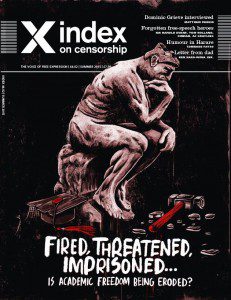5 Jun 2015 | Academic Freedom, Events, mobile, Volume 44.02 Summer 2015

Education, the beginning of so many roads. But if we start closing some of those avenues down, arguing they are too dangerous or challenging, do we begin to travel in a terrifying direction?
From no-platform policies to campus extremism, and student sit-ins to the correct balance between safety and liberty, join us to explore the global situation for freedom of expression on campus.
Come to our lively Question Time-style discussion, chaired by Index on Censorship’s CEO Jodie Ginsberg and introduced by magazine editor Rachael Jolley.
With speakers including:
- Nicola Dandridge, chief executive, Universities UK
- Greg Lukianoff, president and chief executive, Foundation for Individual Rights in Education, USA
- Lord Ken Macdonald, barrister, former director of public prosecution, and warden, Wadham College, Oxford
- Julie Bindel, journalist, broadcaster, author and feminist campaigner
- Siana Bangura, blogger, writer, spoken word poet
Followed by a summer drinks reception.
When: Wednesday 1 July, 6:30-7:30pm event, followed by drinks reception
Where: Clore Centre, Birkbeck College, University of London, WC1E 7HX (Map/directions)
Tickets: Free, registration is required as space is limited.
Presented in conjunction with The Conversation, SAGE Publishing and Arts Council England.

24 Apr 2015 | Academic Freedom, Magazine, Volume 44.01 Spring 2015
In my column in the latest issue of Index magazine, re-published below, I explored the shrinking space for free expression on university campuses. It’s getting worse. Earlier this week, we learned Queen’s University in Belfast had cancelled a conference on the fallout from the Charlie Hebdo attack, citing security fears. That followed a decision by the University of Southampton to axe a conference on Israel after pressure from the Zionist Federation UK. Another group is now pressurising respected medical journal The Lancet over its coverage of Palestine.
Index condemns these attempts to stifle free and open debate. It is clear that academic freedom is under threat from special interest groups who believe that no one should be exposed to ideas that they find personally offensive. The result is that the universe of ideas and opinions is shrivelling. We need to push back, and universities, students, academics and academic publications must resist this pressure.
Something is going wrong at universities. Institutions that should be crucibles for new thinking, at the forefront of challenges to established thought and practice, are instead actively shutting down debate, and shying away from intellectual confrontation.
Driven by the notion that students should not be exposed to ideas they find – or might find – offensive or troubling, student groups and authorities are increasingly squeezing out free speech – by banning controversial speakers, denying individuals or groups platforms to speak, and eliminating the possibility of “accidental” exposure to new ideas through devices such as trigger warnings.
The trend was particularly noticeable last year when a number of invited speakers withdrew from university engagements – or had their invitations rescinded – following protests from students and faculty members. Former US Secretary of State Condoleezza Rice withdrew from a planned address at Rutgers University in New Jersey after opposition from those who cited her involvement in the Iraq war and the Bush administration’s torture of terrorism suspects; Brandeis University in Massachusetts cancelled plans to award an honorary degree to Islam critic Ayaan Hirsi Ali; and Christine Lagarde backed out of a speech at Smith College following objections by students over the acts of the International Monetary Fund, which Lagarde runs. In the UK, the University of East London banned an Islamic preacher for his views on homosexuality. And a new law – a counter-terrorism bill – was proposed in Britain that could be used to force universities to ban speakers considered “extremist”.
Registering your objection to something or someone is one thing. Indeed, the ability to do that is fundamental to free expression. Actively seeking to prevent that person from speaking or being heard is quite another. It is a trend increasingly visible in social media – and its appearance within universities is deeply troubling.
It is seen not just in the way invited speakers are treated, but it stretches to the academic fraternity itself. Last year, the University of Illinois at Urbana-Champaign withdrew a job offer to academic Steven Salaita following critical posts he made on Twitter about Israel.
In an open letter, Phyllis Wise, University of Illinois at Urbana-Champaign chancellor, in an open letter, wrote: “A pre-eminent university must always be a home for difficult discussions and for the teaching of diverse ideas… What we cannot and will not tolerate at the University of Illinois are personal and disrespectful words or actions that demean and abuse either viewpoints themselves or those who express them. We have a particular duty to our students to ensure that they live in a community of scholarship that challenges their assumptions about the world but that also respects their rights as individuals.”
These incidents matter because, as education lecturer Joanna Williams wrote in The Telegraph newspaper: “If academic freedom is to be in anyway meaningful it must be about far more than the liberty to be surrounded by an inoffensive and bland consensus. Suppressing rather than confronting controversial arguments prevents criticality and the advance of knowledge, surely the antithesis of what a university should be about?”
Yet, increasingly, universities seem to want to shut down controversy, sheltering behind the dangerous notion that protecting people from anything but the blandest and least contentious ideas is the means to keep them “safe”, rather than encouraging students to have a wide base of knowledge. In the US, some universities are considering advising students that they don’t have to read material they may find upsetting, and if they don’t their course mark would not suffer, according to the Los Angeles Times.
In the UK, increasing intolerance for free expression is manifest in the “no platform” movement – which no longer targets speakers or groups that incite violence against others, but a whole host of individuals and organisations that other groups simply find distasteful, or in some way disqualified from speaking on other grounds.
The decision to cancel an abortion debate at Oxford in late 2014, which would have been held between two men – and noted free speech advocates – came after a slew of objections, including a statement from the students’ union that decried the organisers for having the temerity to invite people without uteruses to discuss the issue.
Encountering views that make us feel uncomfortable, that challenge our worldview are fundamental to a free society. Universities are places where that encounter should be encouraged and celebrated. They should not be places where ideas are wrapped in cotton wool, where academic freedom comes to mean having a single kind of approved thinking, or where only certain “approved” individuals are allowed to speak on a given topic.
Index on Censorship knows well the importance of the scholar in freedom of expression. Though we have come to be known as Index, the charity itself is officially called Writers and Scholars International, an effort to capture as simply as possible the individuals whom we intended to support from the outset. The title was never intended to be exclusive, but the inclusion of “scholar” signals the importance our founders attached to the role of the academic as a defender and promoter of free speech. In 2015, as we watch the spaces for free expression narrow, we will work doubly hard to ensure that university remains an arena for the clash of ideas, not the closure of minds.
This article is part of Across the wires, the spring 2015 issue of Index on Censorship magazine and was first published in early March. Follow the magazine on @Index_magazine. To read other articles from the issue, subscribe to Index magazine online here, also available on your iPhone, iPad or Android devices. For more subscription options, visit our subscribe page.
12 Mar 2015 | mobile, News, Volume 44.01 Spring 2015

Tim Cross and Martha Lane Fox, credit: Mark Boardman
Martha Lane Fox and retired Major General Tim Cross debate how far governments go when balancing individual rights and safeguarding the nation. This is an extract from a longer feature in the latest issue of Index on Censorship magazine.
Martha Lane Fox
When it comes to balancing national security and personal privacy, I believe that your personal data should be your personal data, and that action should be taken based on a case that can be proven, as opposed to looking at everyone in society’s movements and then targeting those who stand out. I am not a fan of the world we seem to be ending up in, and I don’t necessarily believe that it is because of anything malicious. I think it would be better to have a system where your data is your personal property, and there then have to be the same restrictions applied as would be the case if someone wanted to enter your home and go through your belongings or intercept your post.
Tim Cross
Like fighting terrorism, governments have to “fight” with one hand tied behind their backs, but they cannot fight with both hands tied as some would clearly prefer. Individuals will understandably not want governments interfering with, or prying into, their personal privacy, but no one will thank any government if the banking system or consumer supply chains were to collapse. Monitoring cyberspace now forms a key part of any government responsibilities, and is (or should be) included in any national security strategy.
This said, if people fear the state is holding too much data on them unnecessarily and (rightly) demand some semblance of control over what happens with that data, then government is the least of their worries. Leaving aside the fact that government resources are scarce, the idea that some government employee is sitting in a room somewhere carefully sifting through everyone’s email is fanciful. Intelligence and law enforcement have to meet certain criteria including necessity, proportionality and justification. This is absolutely the way it should be. But private firms have no such restrictions in place. Government intelligence and law enforcement agencies are rightly burdened by layers of legality, including authorisations, justifications and audit trails, but big corporations, particularly those whose primary public interface is through cyber means, use and exploit personal details for a wide variety of reasons. While these may sometimes include improving their services, more unpalatably they sell details on to third parties. This is absolutely endemic. Many companies will not allow customers to use their service unless they agree to terms and conditions that essentially mean losing control of their personal details and allowing them to be sold on to the highest bidders. The primary concern of business is making money. Not so with governments, whose intelligence and law enforcement agencies are about deterring/catching enemies and protecting the public.
To read the rest of the debate, click here to subscribe to Index on Censorship magazine. Or buy an individual issue. Or subscribe to the app (free 30-day trial).
Major General (Rtd) Tim Cross (CBE) was commissioned into the British Army in 1971.
He served in Northern Ireland, Macedonia, Albania and Kosovo. He was also the British deputy to the US-led Office of Reconstruction and Humanitarian Affairs, later re-titled the Coalition Provisional Authority. He is chair of the think-tank Theos
Martha Lane Fox is chair of Go On UK, a digital skills charity which helps people to get online. She co-founded travel website lastminute.com, and in 2013 became a crossbench peer in the House of Lords
7 Mar 2015 | Magazine, Magazine Editions, Volume 44.01 Spring 2015
[vc_row disable_element=”yes” css=”.vc_custom_1495015777980{margin-right: 0px !important;margin-left: 0px !important;border-bottom-width: 1px !important;padding-top: 15px !important;padding-bottom: 15px !important;border-bottom-color: #455560 !important;border-bottom-style: solid !important;}”][vc_column css=”.vc_custom_1474781640064{margin: 0px !important;padding: 0px !important;}”][vc_column_text css=”.vc_custom_1477669802842{margin-top: 0px !important;margin-right: 0px !important;margin-bottom: 0px !important;margin-left: 0px !important;padding-top: 0px !important;padding-right: 0px !important;padding-bottom: 0px !important;padding-left: 0px !important;}”]CONTRIBUTORS[/vc_column_text][/vc_column][/vc_row][vc_row disable_element=”yes” css=”.vc_custom_1495015786238{margin-top: 0px !important;padding-top: 0px !important;}”][vc_column width=”1/3″ css=”.vc_custom_1474781919494{padding-top: 0px !important;padding-bottom: 0px !important;}”][staff name=”Karim Miské” title=”Novelist” color=”#ee3424″ profile_image=”89017″]Karim Miské is a documentary maker and novelist who lives in Paris. His debut novel is Arab Jazz, which won Grand Prix de Littérature Policière in 2015, a prestigious award for crime fiction in French, and the Prix du Goéland Masqué. He previously directed a three-part historical series for Al-Jazeera entitled Muslims of France. He tweets @karimmiske[/staff][/vc_column][vc_column width=”1/3″ css=”.vc_custom_1474781952845{padding-top: 0px !important;padding-bottom: 0px !important;}”][staff name=”Roger Law” title=”Caricaturist ” color=”#ee3424″ profile_image=”89217″]Roger Law is a caricaturist from the UK, who is most famous for creating the hit TV show Spitting Image, which ran from 1984 until 1996. His work has also appeared in The New York Times, The Observer, The Sunday Times and Der Spiegel. Photo credit: Steve Pyke[/staff][/vc_column][vc_column width=”1/3″ css=”.vc_custom_1474781958364{padding-top: 0px !important;padding-bottom: 0px !important;}”][staff name=”Canan Coşkun” title=”Journalist” color=”#ee3424″ profile_image=”89018″]Canan Coşkun is a legal reporter at Cumhuriyet, one of the main national newspapers in Turkey, which has been repeatedly raided by police and attacked by opponents. She currently faces more than 23 years in prison, charged with defaming Turkishness, the Republic of Turkey and the state’s bodies and institutions in her articles.[/staff][/vc_column][/vc_row][vc_row equal_height=”yes” content_placement=”top” css=”.vc_custom_1474815243644{margin-top: 30px !important;margin-right: 0px !important;margin-bottom: 30px !important;margin-left: 0px !important;}”][vc_column width=”1/2″ css=”.vc_custom_1474619182234{background-color: #455560 !important;}”][vc_column_text el_class=”text_white”]Editorial
Nothing is national any more, everything and everyone is connected internationally: economies, communication systems, immigration patterns, wars and conflicts all map across networks of different kinds. Those linking networks can leave the world better informed and more aware of its connections, or those networks can fail to acknowledge their intersections, while carrying as much misinformation as information.[/vc_column_text][/vc_column][vc_column width=”1/4″ css=”.vc_custom_1474720631074{margin-top: 0px !important;margin-bottom: 0px !important;padding-top: 0px !important;padding-right: 0px !important;padding-bottom: 0px !important;padding-left: 0px !important;background-color: #78858d !important;}” el_class=”image-content-grid”][vc_row_inner css=”.vc_custom_1495015899799{margin-top: 0px !important;margin-right: 0px !important;margin-bottom: 0px !important;margin-left: 0px !important;border-top-width: 0px !important;border-right-width: 0px !important;border-bottom-width: 0px !important;border-left-width: 0px !important;padding-top: 65px !important;padding-right: 0px !important;padding-bottom: 65px !important;padding-left: 0px !important;background-image: url(https://www.indexoncensorship.org/wp-content/uploads/2015/03/magazine.jpg?id=64775) !important;background-position: center !important;background-repeat: no-repeat !important;background-size: cover !important;}”][vc_column_inner css=”.vc_custom_1474716958003{margin: 0px !important;border-width: 0px !important;padding: 0px !important;}”][/vc_column_inner][/vc_row_inner][vc_column_text css=”.vc_custom_1495015935223{margin-top: 0px !important;margin-right: 0px !important;margin-bottom: 0px !important;margin-left: 0px !important;padding-top: 20px !important;padding-right: 20px !important;padding-bottom: 20px !important;padding-left: 20px !important;background-color: #78858d !important;}” el_class=”text_white”]Contents
A look at what’s inside the spring 2015 issue[/vc_column_text][/vc_column][vc_column width=”1/4″ css=”.vc_custom_1474720637924{margin-top: 0px !important;margin-bottom: 0px !important;padding-top: 0px !important;padding-right: 0px !important;padding-bottom: 0px !important;padding-left: 0px !important;background-color: #78858d !important;}” el_class=”image-content-grid”][vc_row_inner css=”.vc_custom_1495016773444{margin-top: 0px !important;margin-right: 0px !important;margin-bottom: 0px !important;margin-left: 0px !important;border-top-width: 0px !important;border-right-width: 0px !important;border-bottom-width: 0px !important;border-left-width: 0px !important;padding-top: 65px !important;padding-right: 0px !important;padding-bottom: 65px !important;padding-left: 0px !important;background-image: url(https://www.indexoncensorship.org/wp-content/uploads/2015/04/4296204146_33b0eb8b50_o.jpg?id=65863) !important;background-position: center !important;background-repeat: no-repeat !important;background-size: cover !important;}”][vc_column_inner css=”.vc_custom_1474716958003{margin: 0px !important;border-width: 0px !important;padding: 0px !important;}”][/vc_column_inner][/vc_row_inner][vc_column_text css=”.vc_custom_1495016143299{margin-top: 0px !important;margin-right: 0px !important;margin-bottom: 0px !important;margin-left: 0px !important;padding-top: 20px !important;padding-right: 20px !important;padding-bottom: 20px !important;padding-left: 20px !important;background-color: #78858d !important;}” el_class=”text_white”]Global View
The shrinking space for free expression on university campuses. It’s getting worse.[/vc_column_text][/vc_column][/vc_row][vc_row equal_height=”yes” css=”.vc_custom_1491994247427{margin-top: 0px !important;margin-right: 0px !important;margin-bottom: 0px !important;margin-left: 0px !important;}”][vc_column width=”1/3″ css=”.vc_custom_1493814833226{margin-top: 0px !important;margin-right: 0px !important;margin-bottom: 0px !important;margin-left: 0px !important;border-top-width: 0px !important;border-right-width: 0px !important;border-bottom-width: 0px !important;border-left-width: 0px !important;padding-top: 0px !important;padding-right: 0px !important;padding-bottom: 0px !important;padding-left: 0px !important;background-color: #78858d !important;}”][vc_row_inner css=”.vc_custom_1495016306180{margin-top: 0px !important;margin-right: 0px !important;margin-bottom: 0px !important;margin-left: 0px !important;border-top-width: 0px !important;border-right-width: 0px !important;border-bottom-width: 0px !important;border-left-width: 0px !important;padding-top: 65px !important;padding-right: 0px !important;padding-bottom: 65px !important;padding-left: 0px !important;background-image: url(https://www.indexoncensorship.org/wp-content/uploads/2016/09/eritrea-1-yonatan-tewelde-with-permission.png?id=78123) !important;background-position: center !important;background-repeat: no-repeat !important;background-size: cover !important;}”][vc_column_inner 0=””][/vc_column_inner][/vc_row_inner][vc_column_text css=”.vc_custom_1495016242267{margin-top: 0px !important;margin-right: 0px !important;margin-bottom: 0px !important;margin-left: 0px !important;padding-top: 20px !important;padding-right: 20px !important;padding-bottom: 20px !important;padding-left: 20px !important;background-color: #78858d !important;}” el_class=”text_white”]Escape from Eritrea
As refugees flee one of the world’s most repressive and secretive regimes, Ismail Einashe talks to Eritreans who have reached the UK but who still worry about the risks of speaking out.[/vc_column_text][/vc_column][vc_column width=”1/3″ css=”.vc_custom_1493815095611{padding-top: 0px !important;padding-right: 0px !important;padding-bottom: 0px !important;padding-left: 0px !important;background-color: #78858d !important;}” el_class=”image-content-grid”][vc_row_inner css=”.vc_custom_1495016539021{margin-top: 0px !important;margin-right: 0px !important;margin-bottom: 0px !important;margin-left: 0px !important;border-top-width: 0px !important;border-right-width: 0px !important;border-bottom-width: 0px !important;border-left-width: 0px !important;padding-top: 65px !important;padding-right: 0px !important;padding-bottom: 65px !important;padding-left: 0px !important;background-image: url(https://www.indexoncensorship.org/wp-content/uploads/2015/03/Do-you-see-what-I-see1.jpg?id=65075) !important;background-position: center !important;background-repeat: no-repeat !important;background-size: cover !important;}”][vc_column_inner 0=””][/vc_column_inner][/vc_row_inner][vc_column_text css=”.vc_custom_1495016592354{margin-top: 0px !important;margin-right: 0px !important;margin-bottom: 0px !important;margin-left: 0px !important;padding-top: 20px !important;padding-right: 20px !important;padding-bottom: 20px !important;padding-left: 20px !important;background-color: #78858d !important;}” el_class=”text_white”]Social Media Connections
Jason DaPonte looks at how migrants are using technology to keep in touch with distant relatives, and the security risks this can bring. [/vc_column_text][/vc_column][vc_column width=”1/3″ css=”.vc_custom_1493815155369{padding-top: 0px !important;padding-right: 0px !important;padding-bottom: 0px !important;padding-left: 0px !important;background-color: #78858d !important;}” el_class=”image-content-grid”][vc_row_inner css=”.vc_custom_1495016635152{margin-top: 0px !important;margin-right: 0px !important;margin-bottom: 0px !important;margin-left: 0px !important;border-top-width: 0px !important;border-right-width: 0px !important;border-bottom-width: 0px !important;border-left-width: 0px !important;padding-top: 65px !important;padding-right: 0px !important;padding-bottom: 65px !important;padding-left: 0px !important;background-image: url(https://www.indexoncensorship.org/wp-content/uploads/2016/11/student_reading_list_shutterstock_160993595_1460X490-480-400-c.png?id=80964) !important;background-position: center !important;background-repeat: no-repeat !important;background-size: cover !important;}”][vc_column_inner 0=””][/vc_column_inner][/vc_row_inner][vc_column_text css=”.vc_custom_1495016698861{margin-top: 0px !important;margin-right: 0px !important;margin-bottom: 0px !important;margin-left: 0px !important;padding-top: 20px !important;padding-right: 20px !important;padding-bottom: 20px !important;padding-left: 20px !important;background-color: #78858d !important;}” el_class=”text_white”]Student Reading Lists
Browse our lists of censorship topics for help in research.
[/vc_column_text][/vc_column][/vc_row][vc_row][vc_column width=”1/2″][vc_single_image image=”90659″ img_size=”full” onclick=”custom_link” link=”https://shop.exacteditions.com/gb/index-on-censorship”][/vc_column][vc_column width=”1/2″][vc_column_text]
Subscribe to Index on Censorship magazine on your Apple, Android or desktop device for just £17.99 a year. You’ll get access to the latest thought-provoking and award-winning issues of the magazine PLUS ten years of archived issues, including Across the wires.
Subscribe now.
[/vc_column_text][/vc_column][/vc_row]




